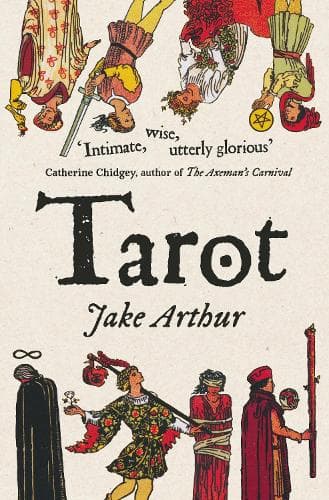Review: Tarot, by Jake Arthur
Reviewed by Erica Stretton
In an essay on the Spinoff, speaking of his second poetry collection Tarot, Jake Arthur muses that amongst great advances in science and technology, tarot provided mystery: ‘as if [it] were something people needed, as if it was essential’. Tarot begins with ‘Querent (I)’, an appeal to a ‘sceptic’, to sit for a tarot reading:
‘Here are the cards. Put your hand on them,
Close your eyes. You don’t want to?
But you are blind with them open.’
From here, the poems, each corresponding loosely with a tarot card from the famous 1909 Rider-Waite tarot deck, take us through a riot of different scenarios, each delving into the life of a single character, their intimacies, their triumphs, and their darknesses. And throughout, each poem holds up a moment, asking an existential or crossroads question.
Arthur doesn’t hold back from playfulness, but nor does he dumb down language for the uninitiated. Words are to be enjoyed and celebrated – ‘copacetic’, ‘lowing’, ‘hebdomadel’, for example. Love features often, as does mortality: but the book adventures through many, many facets of the human condition, beguiling and enticing, until it circles back to the original subject of the tarot reading and sums up the book:
‘There’s no single voice.
No fact is binding.
Watch me roll the dice again.
That four: isn’t it also one, three, six?’ ('Querent (II)')
Excerpt from Tarot, by Jake Arthur, published by Te Herenga University Press.
Her two bodies
or Two of Swords
Glimpse this revenant,
This lady of the lake, this Lazarus,
This totemic self in transports
Of ecstasy, just to be back, to be here.
She was me. The me that I forgot,
That I said I made my peace with forgetting
But that I begged back in the insomniac hours.
Now she is back, she has lifted the veil
As easily as if it were a choice, has torn
The flaming cloth from our foreheads.
This woman I barely know, walking out
Of the water, of my memories, holding two swords:
Her working arms made of my broken ones.
And with sublime reproach she approaches me.
I am taking back this body, she says,
This body you have occupied like a decadent court,
Like overstaying guests exhausting its supplies,
Tearing its arrases down to bare alcoves,
Leaving its lights long out, its sconces empty.
She says, I am taking this body back,
Get out.
